Years ago I read Stephen King’s epic Dark Tower series. Right at the start of the second book the antihero, Roland the gunslinger, is sleeping on a beach when a rogue wave hits him, splashing his ammunition belts.
For the rest of the novel, a major plot element is how few rounds he has left that didn’t get splashed, and the unreliability of the ones that did. Of course, if you’re familiar with Stephen King’s work you’ll have realized that he doesn’t actually know very much about guns.
Giving ammunition a quick dip, even in seawater, won’t do it any harm as long as it doesn’t stay wet for a long time. I’ve used ammo that had spent three or four days in a rain-soaked pouch; it still worked fine.
When it comes to long-term storage of ammunition, though, moisture does become a problem. Over time, dampness can make its way into the primer pocket and through the neck of the case.
Related: 5 Ammo Stockpiling Mistakes You Are Probably Making Right Now
Once it’s in there it will degrade the propellant and possibly the primer. Meanwhile, if there’s water inside the case when the round fires, that will evaporate and affect the chamber pressure.
Ammo that’s been stored for a long time in damp conditions might not fire. And if it does it will be inconsistent and inaccurate.
You also need to look out for corrosion on cases. While it’s unlikely cases will corrode badly enough to affect their strength, you could get more stoppages – especially with a semiautomatic weapon.
When you’re relying on a stockpile of ammunition to keep you alive in a crisis, you need to make sure it’s protected from moisture in storage.
Location Matters
The first step in protecting ammunition from dampness is to store it somewhere that isn’t damp. That sounds like a problem for many preppers; a lot of us store our supplies in basements, sheds or bunkers.
⇒ How To Build An Underground Bunker For Only $400
Basements have the extra disadvantage that if the rain gets too heavy or a local river floods, water can quickly find its way in.
Get around that by installing some shelves or racks, and storing your ammunition well off the floor. That way, if the basement does flood your ammo should be spared a ducking.
Avoid storing ammo where it’s in contact with basement walls, because these can often be damp.
Free-standing racks that don’t touch the walls are the best solution, but if you need to keep ammo on wall-mounted shelves be careful not to push it right to the back. Leave some space behind it for air to circulate.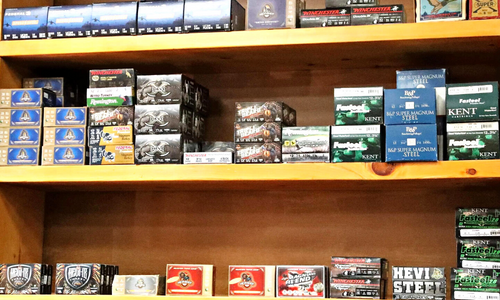
Protecting your supplies from water or damp walls is only half the battle, though. There’s almost always some moisture in the air itself, too, and given time that can attack your ammunition.
Related: Does Ammo Expire? This Man Fired His 60 Year Old Ammo And This Is What Happened
That’s especially true somewhere the air isn’t circulating much, like your basement. To keep it safe from airborne moisture we need to look at packaging and sealing.
Sealing Your Ammunition
When ammunition comes out of the factory it’s generally not fully sealed. The primer and bullet fit into the case tightly enough that water can’t get in if the round gets briefly wet. But over time capillary action will draw moisture through the primer pocket and neck.
Most military ammunition, and some commercial types, have a ring of waterproof lacquer round the primer to fully seal it; steel cases, which are vulnerable to rusting, usually have some kind of protective coating on the steel. However, if you want truly waterproof ammunition you’ll have to proof it yourself.
Many gun shops sell products like X Sealant. Apply a little of this round the primer and neck, then cure it under a UV lamp, and it forms a completely waterproof seal.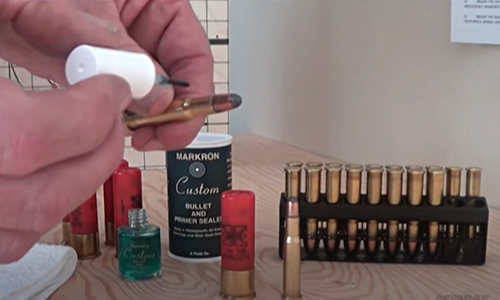
As far as I can tell these products do a great job of keeping moisture out of the case, but they won’t protect the case itself from corrosion. And, if you have a large stockpile of ammunition, it would take you a very long time to seal it.
Related: What To Do In The Upcoming US Ammunition Shortage
If you keep some ready-use ammo in a gun bag or tactical vest, sealant could be a good solution. For your main stockpile it isn’t a realistic option.
A better option is to pack your boxed ammunition into heat-sealed bags. An ordinary vacuum sealer is a great tool for this, but don’t use the vacuum function. Instead, just squeeze surplus air out of the bags before you seal them.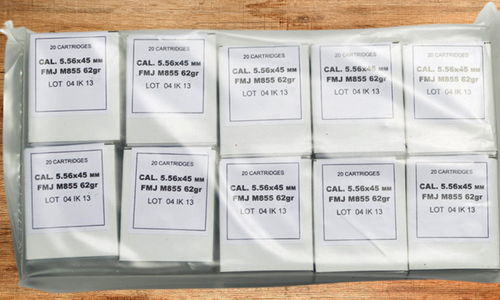
If you vacuum-seal them there will be air left inside each round. Over time this will slowly escape, equalizing the pressure in the cases and the bag.
Then, when you unseal the bag, the pressure inside the cartridges will be lower than the atmosphere and outside air will slowly be sucked in. This is bad news, because it’s going to bring moisture with it.
Not vacuum-sealing the bags means there will be a small amount of moisture trapped inside, but a silica gel sachet will take care of that. Heat sealing ensures no more will get in. If you don’t have a heat sealer use Ziploc bags and, again, add a silica gel sachet.
Protective Packaging
Heat-sealed bags will do a great job at keeping water out, but they’re relatively fragile. Give your ammunition some extra protection by picking up used military ammo cans.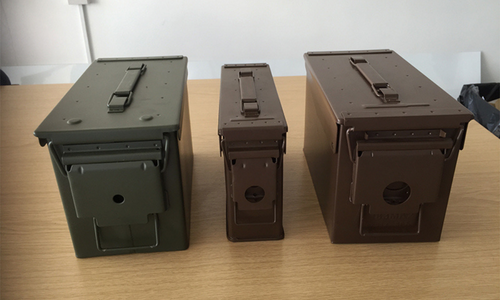
These are made of tough steel, have convenient carrying handles on top, and their lids close tightly and have a rubber weather seal. In fact the military ammunition that comes in them is packed in plain, non-waterproof cardboard boxes. The Army trusts the can itself to keep moisture out even after years in storage.
Between sealing the boxes in plastic, then storing the bags in ammo cans, your supply should be completely safe from dampness.
The cans are also easy to grab off the shelf and throw into a vehicle if you need to bug out in a hurry, and you can take out as much ammunition as you need then reseal the can.
Modern ammunition is pretty robust stuff, but it can deteriorate if you don’t store it properly. The most important thing is to keep moisture away from it. And storing it inside an ammo can in a heat-sealed bag will do exactly that. Protect your ammo stockpile this way and you’ll be able to rely on it when it really counts.

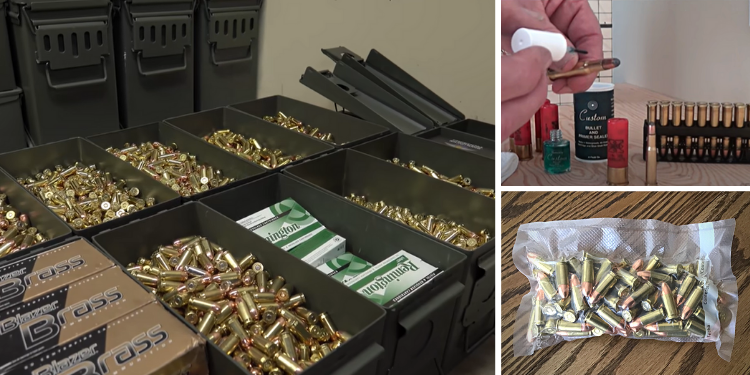

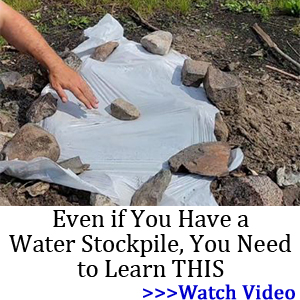


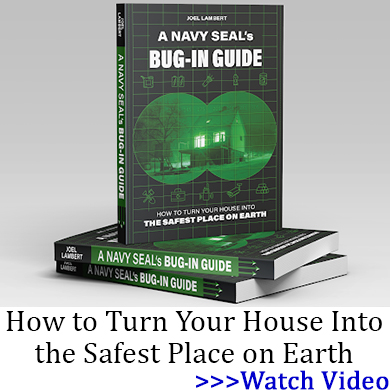





Yep …. in bags with desiccants, then in a good ammo can with good seals (use a good rubber lubricant or conditioner on the seals) and then keep it in a cool, dry place. Always up on shelves, never on a concrete or dirt floor (root cellar type) and you’re good-to-go. Blister packs are the way the military arsenals have done it for decades.
If you use ammo cans, make sure they have serviceable rubber seals, lubricate the seals with silicone sealant used on pools as it will not deteriorate the rubber and will help condition the rubber. If you use a petroleum based product it will ‘rot’ the rubber. Before you close it, place one or two, if they are small, desiccant packets inside and close it. Label the box with what is in it, store it and leave it alone. Check it every year or two to make sure it is OK. When you do this, replace the desiccant packet, just to be sure. I’ve read where some people place an O2 absorber in the can along with the desiccant. It shouldn’t hurt and may help, but I’ve not done this. If you have to store it on a concrete floor, place a wooden board or other similar material under it. Concrete will be cool and may cause condensation within the can. Try to rotate your ammo so it will be ‘first in, first out’, the same as with any stored food.
What about using dilute finger nail polish to seal the ammo primer and case mouth. This is what I did with ammo that headspaces on the case mouth. All ammo was put in .50 cal Ammo cans with oxy and moisture packets and Aviation form-a-gasket lining the rubber seals. That was all I had at that time.
Fred, but how long is it good for? Old-timers used animal- or veggie fats to coat the bullets. But, that only has a short life, as well. Mineral oil works and doesn’t get rancid. My youngest son tried paraffin wax. It worked but the bullets have to be very well cleaned or you’ll be cleaning the barrel a lot. niio
When you fill these cans, be sure to put a date, use masking tape, on the top or side where it will be visible. Stored: …. Need to check ……
I don’t use masking tape anymore. I use white Gorilla tape and a Sharpie for most labels.
I do some basic reloading as a hobby, mostly shotgun and straight walled pistol. I’ve started using finger nail polish as a sealant on the primers and even the crimps of theshot shells. I figure a little extra step can’t hurt. Also something that wasn’t touched on in this article and probably happens more often than moisture contamination is oil contamination.. too much oil in a gun and especially in a magazine can and will find it’s way into the cartridge, usually around the primer pocket. This will very quickly ruin your ammunition. I’m speaking from experience on this note. Never over lubricate a firearm and keep all oils/lubricant away from your ammo.
Try using Gunzilla clr which is the best cleaner and gun lube I’ve ever used. It can be left wet or wiped off which still provides needed lubricant. It’s non-ionic which keeps dust a debris from finding its way into the barrel and lower. After using it and range shooting I’ve noticed it takes fewer patches run thru the barrel to clean effectively. I used Hoppes for years and since i switched I’ll never go back.
Oh boy …. moisture is NOT a problem here so NONE of this applies!
That’s what she said…
I hear the problem is “filling the void”, is that true?
Jesus, I’m 45 miles north of Tucson. We got 3.5 inches of rain in one storm and a lot more in another. Humidity was 74% for days. Yes, it applies because you never know if you’ll need it. Better safe than sorry, no? Walk in beauty
This article is good advice for Practical Preppers that need to live within their means and shop for VALUE, not just whatever is cheapest. I recommend checking the ammunition you buy to see if the primers are lacquered during manufacturing, which is easy to check, just look at the primer and see if it has an obvious red or green “ring” of lacquer, which is what you want to start with, and then use the storage techniques of using desiccants and properly sealing your ammo bags and containers to help keep your ammo from being affected by moisture while in storage.
Yeah. Sadly, or perhaps mercifully, most of the boomers preserving their ammo will never fire a shot. Some will forget where they stashed it, as self assembling nano bots give them synthetic dementia.
Ultimately, Their overly preserved vacuum sealed triple mylar stashes of ammo will fall into the hands of blue hat UN peacekeepers (or IRS lefty pink squads) who confiscate it during home invasions. Operation pink fury, or some other equally whack name.
I think it’s great to stash ammo and all that. I do. But let’s face it, most of you guys have trouble carrying a basket of laundry 2 rooms away. Good luck with that 75lb rucksack full of ammo, mags, tapioca pudding cups, and your nitroglycerin pills.
LOL, these days I’d be happy to be able to shoulder 20 lbs, but, no nitroglycerin, either. No carbs, please. Tobacco, yes. Water, minimum 2 one-gallon jugs of distilled water/day. Rain water holding tank, in-ground with hand pump. Clortabs, definitely. Quart of lemon juice. Many lbs of dried meat. Iodized salt. 1 qt brown stabilized iodine. 1 qt pine tar. Superfine mesh to filter water. Nope, I’m home and staying. Most of the garden is local desert plants that do well even in a drought. Solar dryer for when the power is killed, and most things dry in a snap here. Mesquite planted all thru a very large garden for nitrogen, food, and defense. Lots of fruit-bearing cactus. All garden beds were dug out to 3 feet, and high carbon material (logs, brush, weeds, even junk mail) were put in, then backfilled with good sandy adobe a la Tohono Indians. Our soil is 8.5%+ calcium but all that carbon helps neutralize it. Topped that with coffee grounds from restaurants and dug it in to make topsoil. That’s topped with a foot of mulch. The garden is slowly becoming a drought tolerant food forest. The dog does his business down back and weeds grow tall, and become mulch. niio
Yawn….
Beware of an old man in a profession where men die young.
Survival is the oldest profession there is.
My method is to rotate stock. I go through about 12,000 a year. Oldest gets shot first and NEVER have less than 3,000 or each caliber that I shoot.
Costly, but effective since it means that I’m also keeping my skills up.
Another, probably obvious way to store your ammo is placing it in your gun safe with your guns, AND a dehumidifying heat bar (electric) at the base of the safe. Keeps all your guns and ammo (and important paperwork) DRY……and warm too.
Safes are silly
raven: Why? No burglar is going to move one and can’t get in a good one.
All safes can be defeated by a 4 inch battery operated angel grinder by cutting the the side out.
Plus nothing like needing your rifle with it locked up
and – gun safes are only as “safe” as the overall OPSEC around it >>> crooks don’t bother doing an on-site break-in – they throw a chain around it and drag it out of the house …
if you got the gun safe sitting out in the open for every Tom, Dick and Crook to see – at least try to be more creative about it – I see at least 50 safes a year during garage sale season sitting in the open – for all the neighborhood to see every time the door is raised ….
Never store ammo in a gun safe. Even if it is a fire safe, the ammo can explode and ruin your guns as well
raven, it’s called a refrigerator. Ever see something in a bowl left in the fridge for long? It tends to dry out. After a week or so, you might use the freezer, as well, then close it to seal it. As I lived in the swamps of Penna, not unlike swissconsin, I know folks who did both. If any moisture is still in the shell when put in the freezer, it might cause metal to expand, so proceed with caution. Even in Arizona, they still use moisture absorbers.
All good, thanks! Have you tried to wipe down bullets with mineral oil? It doesn’t go rancid and won’t evaporate in a sealed pouch or box. niio
stephen King is a democratic. What did you expect?
Yeah Republicans pass more anti gun laws
I’ve got mine in a unused bedroom converted to a storage room so no moisture and steady temps.
Building a full basement house. Put in a safe room in the corner. 8″ thick concrete walls with a commercial safe door on it. The Well Hung Horse is correct in that many of the cheaper and smaller safes have little physical security on the sides and sometimes even less on the bottom. From years of steel cutting i can attest that cutting through less than 1/8″ steel with an electric angle grinder is fairly easy and relatively quick, cutting through 3/16″‘ to 1/4″ with an angle grinder is drudgery, very slow, and thicker than that, say 3/8″ is even slower. However, if your thief is smart and brings a big electric grinder with a cut-off blade, even 1/2″ plate can be cut fairly readily, especially if only cutting a hole big enough to reach through and pull guns out. I’m aware that ANY burglar, with enough time, can get into most safes currently made and anywhere close to affordable by the general public. And to the Illini Warrior, you are very correct about OPSEC being critical. See people around town who routinely leave garage doors open most of the day. Makes it easier for “other” people to “shop” for a later snatch and grab. My safe room will also double as a storm shelter since we get the occasional tornado now and then. My advice on safes is, If you buy a gun safe from whoever, buy the heaviest made one you can afford, put it in a location that the general public cannot see and anchor it down securely. A p/u truck with a long log chain can remove most safes from most residences. Always doing massive damage with a lot of noise created. Know of it happening several times over the years in my area. Good OPSEC is always your best protection. If only your very closest friends know about your stash of goodies, then it’s a pretty short list to investigate.
I clean out metal paint cans and use them for ammunition storage.